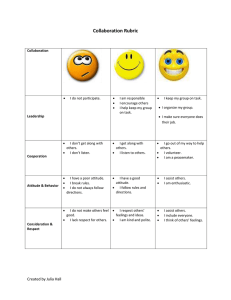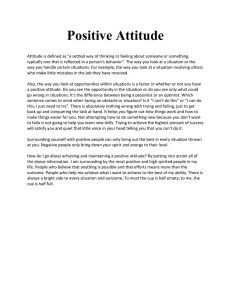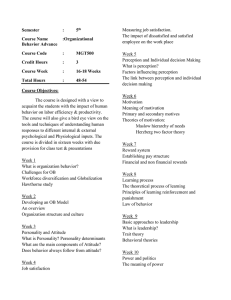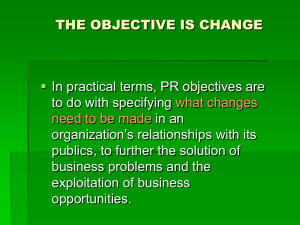Insubordinate Behavior: Managing Employee Conduct & Morale
advertisement
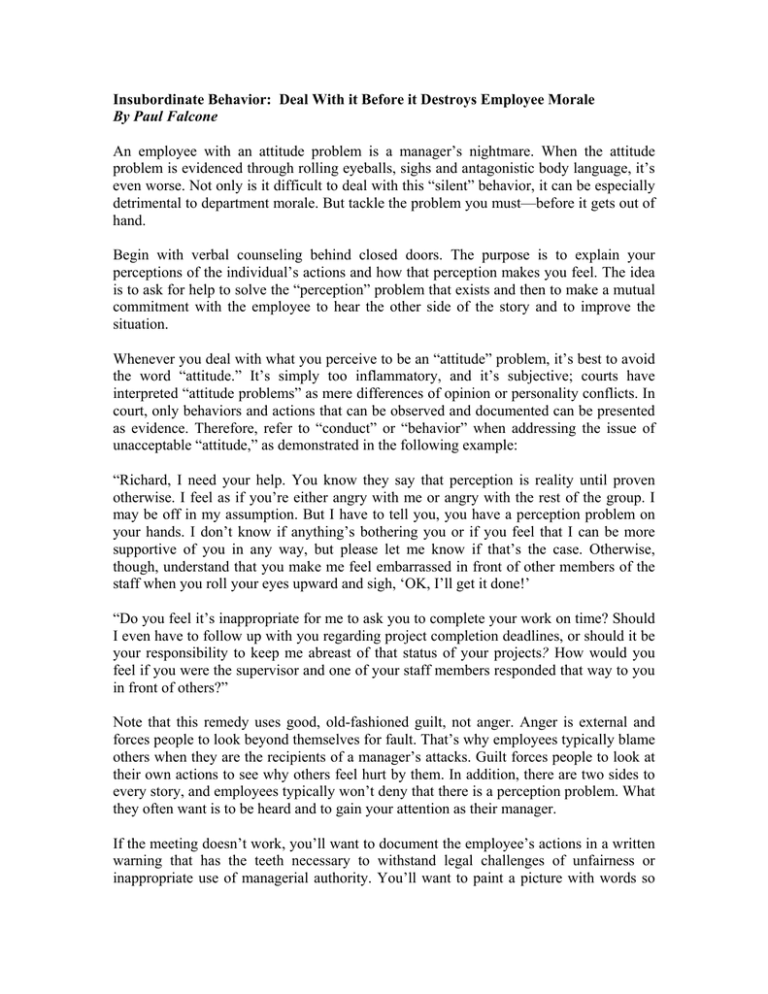
Insubordinate Behavior: Deal With it Before it Destroys Employee Morale By Paul Falcone An employee with an attitude problem is a manager’s nightmare. When the attitude problem is evidenced through rolling eyeballs, sighs and antagonistic body language, it’s even worse. Not only is it difficult to deal with this “silent” behavior, it can be especially detrimental to department morale. But tackle the problem you must—before it gets out of hand. Begin with verbal counseling behind closed doors. The purpose is to explain your perceptions of the individual’s actions and how that perception makes you feel. The idea is to ask for help to solve the “perception” problem that exists and then to make a mutual commitment with the employee to hear the other side of the story and to improve the situation. Whenever you deal with what you perceive to be an “attitude” problem, it’s best to avoid the word “attitude.” It’s simply too inflammatory, and it’s subjective; courts have interpreted “attitude problems” as mere differences of opinion or personality conflicts. In court, only behaviors and actions that can be observed and documented can be presented as evidence. Therefore, refer to “conduct” or “behavior” when addressing the issue of unacceptable “attitude,” as demonstrated in the following example: “Richard, I need your help. You know they say that perception is reality until proven otherwise. I feel as if you’re either angry with me or angry with the rest of the group. I may be off in my assumption. But I have to tell you, you have a perception problem on your hands. I don’t know if anything’s bothering you or if you feel that I can be more supportive of you in any way, but please let me know if that’s the case. Otherwise, though, understand that you make me feel embarrassed in front of other members of the staff when you roll your eyes upward and sigh, ‘OK, I’ll get it done!’ “Do you feel it’s inappropriate for me to ask you to complete your work on time? Should I even have to follow up with you regarding project completion deadlines, or should it be your responsibility to keep me abreast of that status of your projects? How would you feel if you were the supervisor and one of your staff members responded that way to you in front of others?” Note that this remedy uses good, old-fashioned guilt, not anger. Anger is external and forces people to look beyond themselves for fault. That’s why employees typically blame others when they are the recipients of a manager’s attacks. Guilt forces people to look at their own actions to see why others feel hurt by them. In addition, there are two sides to every story, and employees typically won’t deny that there is a perception problem. What they often want is to be heard and to gain your attention as their manager. If the meeting doesn’t work, you’ll want to document the employee’s actions in a written warning that has the teeth necessary to withstand legal challenges of unfairness or inappropriate use of managerial authority. You’ll want to paint a picture with words so that your documentation clearly portrays the employee’s attitudinal actions—without using the term “attitude”—and is able to withstand legal scrutiny. Remember: This kind of document may be shared with a jury as evidence of your management style. Consequently, you will want to adopt an objective writing style that paints a picture with words, along these lines: “Richard, this morning you engaged in insubordinate conduct when you responded to my request to complete the Jones file by the close of the business day. Your initial response was to roll your eyes, sigh and turn to me with your hands on your hips. You stated loudly in front of other members of the staff, ‘If you want that file completed by the end of the day, you can’t ask me any other questions between now and then. I need to be left alone!’ Such comments are unacceptable because they are disrespectful and violate company standards of performance and conduct. “First, you were aware of today’s deadline for the Jones file more than a week ago. Second, your concerns were shared loudly in front of three of your co-workers, and I received feedback that they were embarrassed to have witnessed your actions. Third, you do not have the discretion to insist that all other job responsibilities be removed while you work on a particular project. “In the future, I expect that you will never again voice your frustration in a rude and unprofessional manner. I expect that any future concerns that you have regarding the assignments on your desk will be shared with me privately in my office and not voiced publicly in front of others. Finally, I expect you to inform me any time that you are falling behind on any of your work assignments so that I can provide you with additional support or resources to meet any pre-planned deadlines. Failure to provide immediate and sustained improvement may result in further disciplinary action up to and including termination.” Written records like these clearly describe the employee’s actions in objective terms and spell out your expectations of how the individual should handle the situation if another disagreement occurs. In addition, they outline the consequences of inaction should the employee violate the terms of this warning. Paul Falcone is director of employment and development at Paramount Pictures in Hollywood, Calif. He is the author of three books published by AMACOM, including 101 Sample Write-Ups for Documenting Employee Performance Problems: A Guide to Progressive Discipline and Termination (1999) and 96 Great Interview Questions to Ask Before You Hire (1997). This article represents the views of the author solely as an individual and not in any other capacity. ©2001 Society for Human Resource Management. Members of SHRM are authorized to distribute copies, excerpts or e-mails of this information for educational purposes internally within their organizations. No other republication or external use is allowed without permission of SHRM. The information is not intended to serve as a substitute for legal advice.

